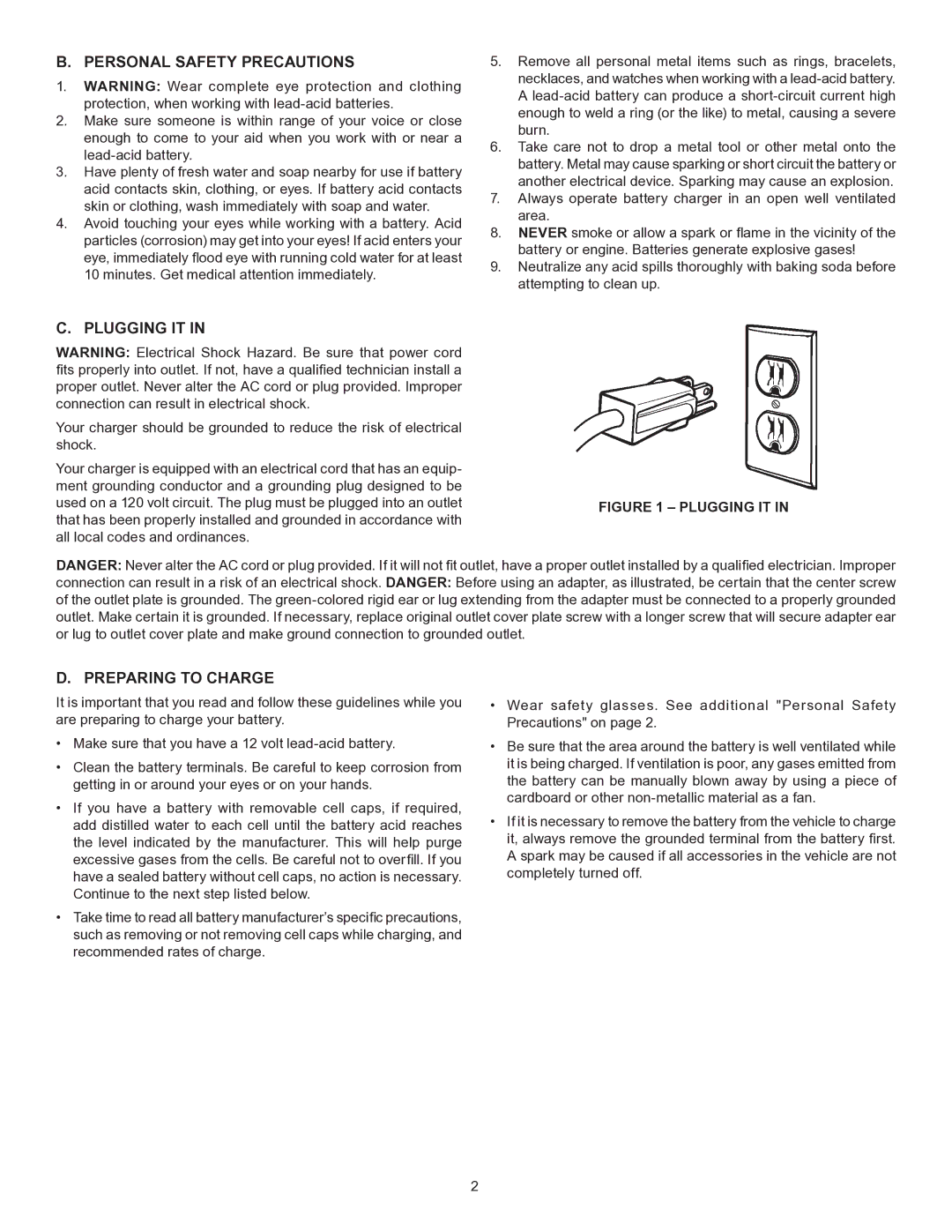
B. PERSONAL SAFETY PRECAUTIONS
1.WARNING: Wear complete eye protection and clothing protection, when working with
2.Make sure someone is within range of your voice or close enough to come to your aid when you work with or near a
3.Have plenty of fresh water and soap nearby for use if battery acid contacts skin, clothing, or eyes. If battery acid contacts skin or clothing, wash immediately with soap and water.
4.Avoid touching your eyes while working with a battery. Acid particles (corrosion) may get into your eyes! If acid enters your eye, immediately flood eye with running cold water for at least
10 minutes. Get medical attention immediately.
5.Remove all personal metal items such as rings, bracelets, necklaces, and watches when working with a
6.Take care not to drop a metal tool or other metal onto the battery. Metal may cause sparking or short circuit the battery or another electrical device. Sparking may cause an explosion.
7.Always operate battery charger in an open well ventilated area.
8.NEVER smoke or allow a spark or flame in the vicinity of the battery or engine. Batteries generate explosive gases!
9.Neutralize any acid spills thoroughly with baking soda before attempting to clean up.
C. Plugging it in
WARNING: Electrical Shock Hazard. Be sure that power cord fits properly into outlet. If not, have a qualified technician install a proper outlet. Never alter the AC cord or plug provided. Improper connection can result in electrical shock.
Your charger should be grounded to reduce the risk of electrical shock.
Your charger is equipped with an electrical cord that has an equip- ment grounding conductor and a grounding plug designed to be
used on a 120 volt circuit. The plug must be plugged into an outletFIGURE 1 – PLUGGING IT IN that has been properly installed and grounded in accordance with
all local codes and ordinances.
DANGER: Never alter the AC cord or plug provided. If it will not fit outlet, have a proper outlet installed by a qualified electrician. Improper
connection can result in a risk of an electrical shock. DANGER: Before using an adapter, as illustrated, be certain that the center screw of the outlet plate is grounded. The
D. PREPARING TO CHARGE
It is important that you read and follow these guidelines while you are preparing to charge your battery.
•Make sure that you have a 12 volt
•Clean the battery terminals. Be careful to keep corrosion from getting in or around your eyes or on your hands.
•If you have a battery with removable cell caps, if required, add distilled water to each cell until the battery acid reaches the level indicated by the manufacturer. This will help purge excessive gases from the cells. Be careful not to overfill. If you have a sealed battery without cell caps, no action is necessary. Continue to the next step listed below.
•Take time to read all battery manufacturer’s specific precautions, such as removing or not removing cell caps while charging, and recommended rates of charge.
•Wear safety glasses. See additional "Personal Safety Precautions" on page 2.
•Be sure that the area around the battery is well ventilated while it is being charged. If ventilation is poor, any gases emitted from the battery can be manually blown away by using a piece of cardboard or other
•If it is necessary to remove the battery from the vehicle to charge it, always remove the grounded terminal from the battery first.
A spark may be caused if all accessories in the vehicle are not completely turned off.
